How Newtown is tackling a rising tide of rough sleepers
Whose responsibility is it to solve homelessness? Do we leave it to government or do communities have a role? In one Sydney suburb, residents have taken up the challenge to help their local rough sleepers — and they’re making a real impact.
It’s 6:30pm on a Wednesday and homeless couple Scott and Roslyn are bundled up in bed on the footpath of King St, Newtown.
The patch of pavement, in the heart of Sydney’s busiest dining strip, has been their home for two months in a six year stint of sleeping rough.
Despite their elaborate set up, to the hundreds of people passing by, they’re largely invisible, the exception being a group of volunteers who make a beeline for them every week.
Known as the Newtopian Outreachers, the volunteers — all local residents — are part of a unique program proving ordinary people can make an impact on homelessness.
“I love them,” said Scott of the volunteers. “They’re the only ones that really talk to us and treat us like normal people.”
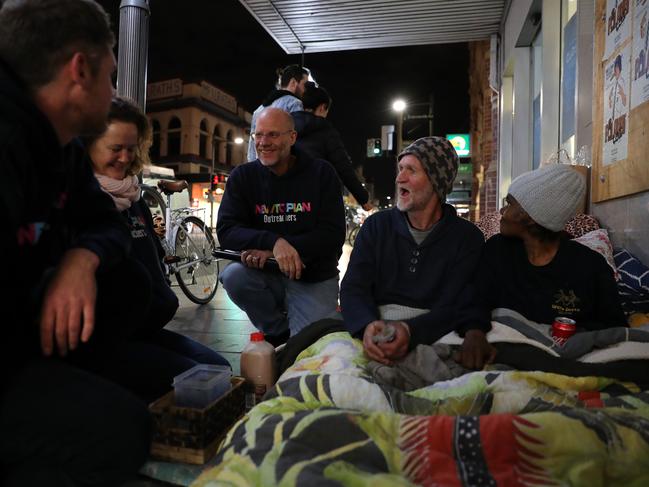
For the past year, the community outreach volunteers have been helping tackle one of the suburb’s biggest challenges in an initiative piloted by Newtown Neighbourhood Centre (NNC).
Newtown has experienced a huge jump in homelessness in recent years, with people begging and sleeping rough now a common sight on King St.
The first big spike was in 2017 after the homeless camps came down in Martin Place and Belmore Park, said the centre’s CEO Liz Yeo. A street count shortly after identified 28 rough sleepers in the suburb. The year before it was two.
“There was someone camping on my street down the road and people knew I worked here so they were asking, ‘What should I do? Should I call the police, should I call an ambulance?” Ms Yeo said. “People wanted to know how to help.”

In response to concern, NNC staff and Elaine Macnish, manager of community strengthening programs, developed a pilot program inviting locals to be part of the solution.
The aim was to increase people’s understanding of homelessness and help them build practical skills to engage.
Nineteen residents signed on, most with no experience with rough sleepers. Among them was Sue Byrne, 53, distressed by the volume of desperate people coming into the suburb.
“I’d always talk to people and offer to buy them a coffee, but I felt really powerless and a bit depressed about not being able to offer anything tangible,” she said.
MORE FROM GILLIAN McNALLY
The ‘dolls’ using cosmetic procedures to remake their face
Why the business of paranormal tourism is booming
After four weeks of training, the volunteers — identifiable by their Newtopian hoodies — hit the streets in May last year.
Accompanied by an NNC staff member, if they met someone who wanted to get off the street, they helped organise temporary accommodation.
If someone was hungry, they helped them find a meal.
They carried phone cards so people could make calls and if someone needed help with issues like housing applications or Centrelink, they were asked to drop into the NNC’s essential service hub, One Stop Shop, the next day where staff could assist them.
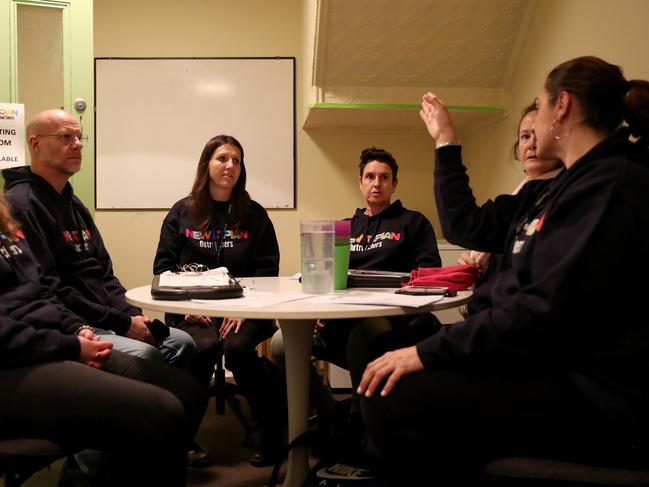
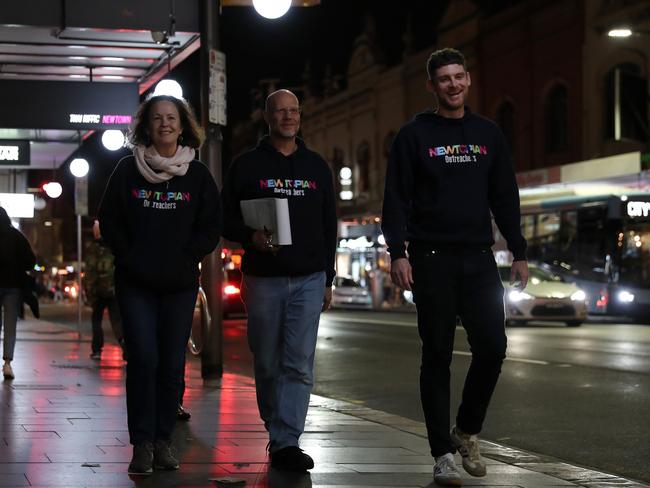
Because homelessness is driven by complex causes including trauma and mental illness, outreach can be confronting, Ms Yeo said.
“People needed to feel safe enough and have enough structure around so there was a sense they could do this,” she said.
“You can’t do this without the backbone of staff and actually get housing outcomes.”
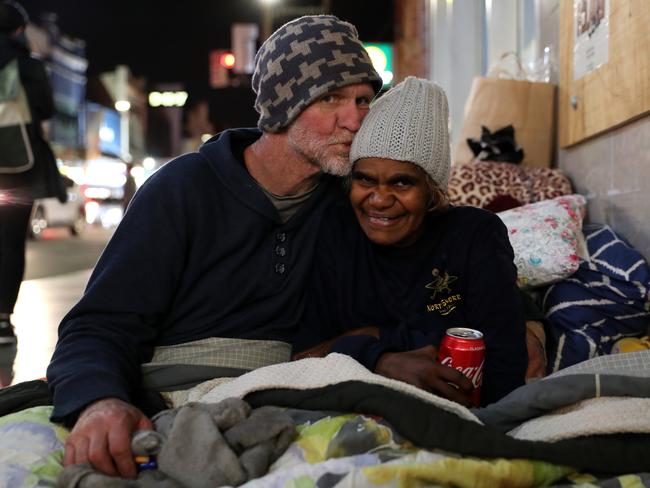
It’s well known that homelessness is increasing and homelessness services are at capacity.
The volunteers weren’t there to replace professionals, Ms Macnish said, but to complement what they could offer, particularly outside regular service hours.
And the connections they made as a result of a simple smile and chat have had a real impact.
In just six months, the outreachers helped connect 15 people with housing and engaged more than 100 people on the street, ensuring people knew where to find support.
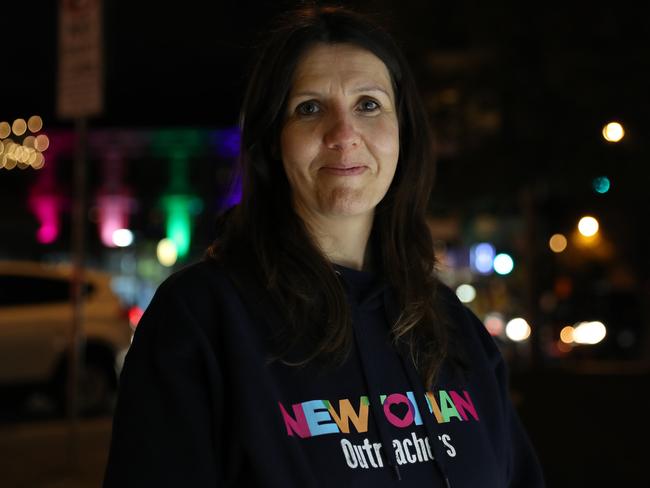
The more familiar people have become with the volunteers, the easier it has been to connect them to longer-term assistance through NNC’s social workers and housing co-ordinator.
“Last week when we were out, we actually had people queuing to talk to us,” said Ms Macnish. “We engaged with 12 people and that’s a really big number.”
Some were rough sleepers, others couch surfing. One woman in her 50s was living in a shed where for an extra $20, the owner let her shower three times a week.
“What we are seeing more and more is people not being able to afford housing,” she said.
“We’ve got people going, ‘I’m willing to pay rent but actually I can’t get somewhere’.
“A few years ago you could go out west and you could afford it, but even in the areas where it was affordable actually now, it’s not.”
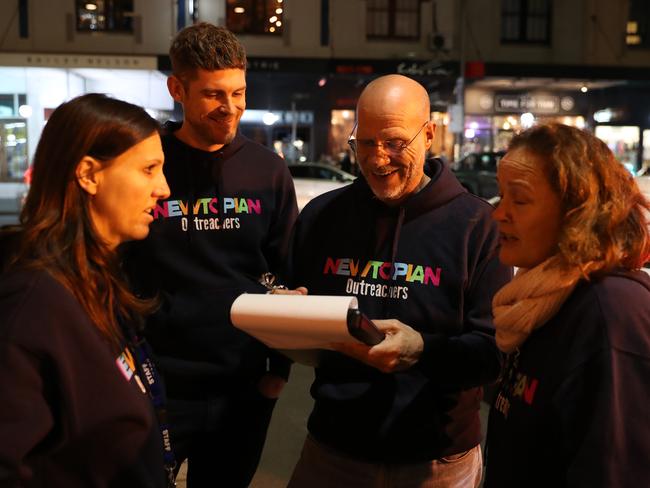
Ms Macnish said most rough sleepers felt invisible and ignored, and the program has demonstrated how important the simple act of talking is to someone doing it tough.
“For those people that are really isolated, who don’t have connections and aren’t accessing services, they’re the ones we can really make a difference to,” she said.
For the volunteers, the outreach has created a greater sense of empathy and far less helplessness in the face of what is a challenging issue for the inner west suburb.
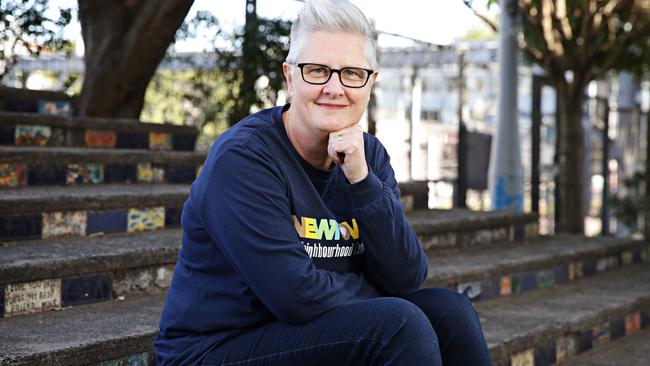
Although initially a six-month pilot, 85 per cent of volunteers have continued on as outreachers and nine more have signed up.
The program will continue through the winter this year although it is no longer funded.
Ms Yeo said there was so much community interest in the project, the centre was now trying to sustain it using its general funding.
“We need communities and philanthropists to get behind it because governments don’t often fund this kind of stuff,” Ms Yeo said.
“We’re not trying to be heroes or saviours or anything like that.
“Sometimes it’s about just doing something, sometimes it’s so basic, that simple act of actually connecting.”


